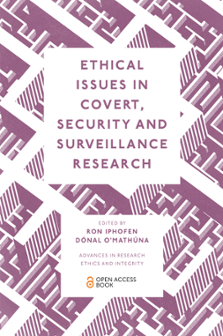
Index
Ethical Issues in Covert, Security and Surveillance Research
ISBN: 978-1-80262-414-4, eISBN: 978-1-80262-411-3
ISSN: 2398-6018
Open Access. Publication date: 9 December 2021
Citation
(2021), "Index", Iphofen, R. and O'Mathúna, D. (Ed.) Ethical Issues in Covert, Security and Surveillance Research (Advances in Research Ethics and Integrity, Vol. 8), Emerald Publishing Limited, Leeds, pp. 211-218. https://doi.org/10.1108/S2398-601820210000008015
Publisher
:Emerald Publishing Limited
Copyright © 2022 Ron Iphofen and Dónal O'Mathúna
License
These works are published under the Creative Commons Attribution (CC BY 4.0) licence. Anyone may reproduce, distribute, translate and create derivative works of these works (for both commercial and non-commercial purposes), subject to full attribution to the original publication and authors. The full terms of this licence may be seen at http://creativecommons.org/licences/by/4.0/legalcode
INDEX
- Prelims
- Introduction: Ethical Issues in Covert, Security and Surveillance Research
- Chapter 1: Surveillance Ethics: An Introduction to an Introduction
- Chapter 2: Science, Ethics, and Responsible Research – The Case of Surveillance
- Chapter 3: Research Is Not a Private Matter
- Chapter 4: Covert Research Ethics
- Chapter 5: Taking Shortcuts: Correlation, Not Causation, and the Moral Problems It Brings
- Chapter 6: The Big Data World: Benefits, Threats and Ethical Challenges
- Chapter 7: Health Data, Public Interest, and Surveillance for Non-health-Related Purposes
- Chapter 8: Privacy and Security: German Perspectives, European Trends and Ethical Implications
- Chapter 9: A Framework for Reviewing Dual Use Research
- Chapter 10: Security Risk Management in Hostile Environments: Community-based and Systems-based Approaches
- Chapter 11: Conducting Ethical Research in Sensitive Security Domains: Understanding Threats and the Importance of Building Trust
- Chapter 12: Covert Aspects of Surveillance and the Ethical Issues They Raise
- Guidance Notes for Reviewers and Policymakers on Covert, Deceptive and Surveillance Research
- Index